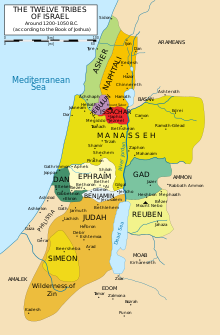Tribe of Benjamin
 |
|
| Geographical range | West Asia |
|---|---|
| Period | Confederated Tribes of Israel |
| Dates | ? – c. 1050 BCE |
| Major sites | Jerusalem |
| Preceded by | New Kingdom of Egypt |
| Followed by | Kingdom of Israel (united monarchy) |
According to the Torah, the Tribe of Benjamin (Hebrew: שבט בִּנְיָמִין, Modern Shevat Binyamin, Tiberian Shevaṭ Binyāmîn) was one of the Tribes of Israel descended from Benjamin, the youngest son of the patriarch Jacob and his wife Rachel. In the Samaritan Pentateuch the name appears as Binyamīm (Hebrew: בנימים, "Son of my right hand").
From after the conquest of the promised land by Joshua until the formation of the first Kingdom of Israel, the Tribe of Benjamin was a part of a loose confederation of Israelite tribes. No central government existed, and in times of crisis the people were led by ad hoc leaders known as Judges (see the Book of Judges).
Almost the entire tribe of Benjamin, women and children included, was wiped out by the other Israelite tribes after the Battle of Gibeah (related in the Hebrew Bible in Judges 20). The text refers several times to the Benjaminite warriors as "men of valour" despite their defeat. A remnant of the tribe was spared: "those few who remained" were allowed to marry women of another town, whose husbands had been killed, to enable the tribe to continue (Judges 21).
...
Wikipedia
